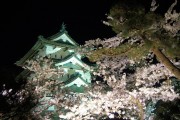Paantu is an yearly festival that takes place on the island of Miyakojima, Okinawa, in which locals dress up in masks and vines to embody supernatural creatures (also called Paantu). The Paantu run around villages smearing sacred mud on residents and buildings to ward off evil and bring good luck.
This year’s Paantu celebration has drawn attention due to tourist complaints that the mischief-making creatures are far too aggressive, chasing down and smearing mud on visitors who don’t want to get dirty or aren’t aware of the meaning of the festival. Although this is not the only traditional ceremony to draw complaints like these from Japanese tourists, netizens have expressed little sympathy for the tourists, pointing out that religious ceremonies shouldn’t have to cater to the delicate needs of outsiders.
Where is the line between ceremonial merrymaking and harassment? Is there a way to protect the spirit and meaning of the ceremony without infringing on the comfort of ignorant passersby? Or should the onus be on tourists to stay away if they don’t want to participate?
From Yahoo! Japan:
Trouble Over Sacred Mud Smearing: Paantu in Miyakojima
The Paantu festival, Miyakojima’s nationally designated important intangible folk culture asset, is being bombarded with complaints. The traditional practice, where masked gods mercilessly smear people with mud in order to cleanse them of evil, has caused some unfortunate conflicts with tourists who don’t understand the implications of the tradition and haven’t consented to it.
■ Complaints that “they got me dirty,” and even violence
On the evenings of October 3 and 4 in the Shimajiri Hirara of Miyakojima, three youths in masks got dressed up to embody the Paantu.
Their bodies were wreathed in vines and smeared with mud, and a strange smell that assaulted the nose drifted around them. When they chased after people trying to run away and smeared mud on them, screams rang out. They also wildly pushed their way into newly renovated houses and automobiles.
”Nobody’s mad! They’re just warding off evil and praying for people’s good health,” an elderly male from the community explained proudly. Local residents smile even if they get smeared with mud. They could also be seen calling out thanks and treating the masked youth to sake or sushi.
On the other hand, a young female tourist whose flower-patterned dress and camera had been covered in mud was in a state of shock, saying “I never thought it would go this far.” A middle-age man near her had also been smeared with mud, and complained, “I’m seriously angry.”
Local officials say that there have been increasing complaints from tourists in recent years, and they’re racking their brains to determine how to cope with the rising dissatisfaction. In addition to women saying “they got my clothes dirty” and “someone grabbed me,” a few years ago there was a situation in which the Paantu were assaulted by an angry man. According to a local man, “we put a stop to it and we also investigated the incident.”
To prevent trouble, several attendants have been stationed in the area around the Paantu. Locals have also devised a scheme to prevent the dates of the Paantu festival from being released until just beforehand, to avoid large numbers of idle tourists intruding on the tradition.
The Miyakojima Tourist Association, which until now has advertised the practice as one of the island’s tourist attractions, has accepted the ideas of the locals and is refraining from large-scale publicity. They are no longer publishing a daily schedule on their homepage, and their new policy is to only talk about the Paantu in response to direct inquiries. The head of the association said, “We are certainly reminding everyone to come wearing clothes that are ok to get dirty.”
■ “Respect the gods” –Professor Sudou of Okinawa University
There are events similar to Paantu throughout the nation. Akita Prefecture is also struggling to handle tourist involvement in “Namahage” (a nationally designated important intangible folk culture asset), where people parade through villages wearing demon masks and behaving wildly.
The Namahage demons are known for threatening, “Are there any crying children around?” but in recent years this has been relentlessly criticized as child abuse. In 2007, there was also an incident in which a drunken Namahage forced his way into the women’s bath at a hotel where tourists were staying. To prevent a repeat of this incident, there has been a damper on the wildness of this ritual, and gentler, more well-behaved “feminine Namahage” have increased, but some feel that the charm of the tradition has been lost.
Sudou Yoshihito, Associate Professor of Film and Folklore Studies at Okinawa University, points out, “These sorts of festivals are not haunted house attractions. Those who visit these ceremonies have to research their implications in advance, and they must respect the participants as gods that are important to local residents. I’d like those receiving the visitors at these ceremonies to give them a reminder, such as explaining the traditions clearly in a pamphlet.”
[Vocabulary] Paantu – Three gods who ward off disaster and bring good fortune appear at the beginning of the ninth month of the traditional Japanese calendar. They are wrapped in about 30 kilometers of vines, and they rampage through the village for several hours receiving sake from residents. It’s said that their origins lie in masks with terrifying expressions that drifted ashore on the beach in Shimajiri hundreds of years ago. In 1993, Paantu was designated a national important intangible folk culture asset.
From Yahoo! Japan:
zaw*****:
Why are they so worried about pandering to tourists? However,
“In 2007, there was also an incident in which a drunken Namahage forced his way into the women’s bath at a hotel where tourists were staying.”
This one feels a little different…
sum*****:
There are probably people who come to these things without realizing it, so I think it would be quick and easy to put people around the area with placards saying “People who don’t want to get dirty, please stay away,” but is there some kind of functional problem with doing that? If not, I think that would be the most effective solution…
nev*****:
I think it’s really difficult when the unique festivals and customs that happen in an area get turned into tourist attractions. If you make something a tourist attraction, the content has to be stuff that is generally accepted by everyone, but if you do that then it turns into something with a different meaning from the original. Attracting tourists is important too, but if doing that has a bad influence on the area then you end up losing everything.
sa1*****:
“Locals have also devised a scheme to prevent the dates of the Paantu festival from being released until just beforehand, to avoid large numbers of idle tourists intruding on the tradition.” What will they do if this has the opposite effect, and tourists who don’t know there’s a festival end up involved in it by chance? I think if they get involved in this without any warning then they’ll definitely be pissed. I think it would be better to give advance notice on a large scale so that people who don’t like it can avoid it, and take further counter-measures such as distributing conspicuous items to those who don’t want to be involved so that the Paantu can also avoid them, but nothing like that is written in this article. There’s also a chance that some types of machines will get broken, and if it goes as far as grabbing people then that becomes sexual harassment. Reading about this, I get the sense that the problems for those organizing these events are really huge.
sig*****:
It’s weird for outsiders to local customs to say stuff like this about it. I think there’s sort of a sense like, if it doesn’t suit you don’t come here, go to Hawaii or something. Well, if there are cases where a drunk priest commits sexual harassment or something then that’s different. But I think you should follow local customs, and outsiders shouldn’t get in the way.
ypf*****:
This is entirely the wrong way of handling it. Don’t you think they need to publicize and explain the meaning and subject matter on a large scale? It’s a problem when people come and get involved in these things without knowing anything about it. Is there a problem with informing people by explaining it when they make their reservations for lodging and transport?
oza*****:
This is basically blaming the victim. They went knowingly, and even though there was a pamphlet they didn’t bother to read it? Way to be completely blind to your own lack of awareness. Or do you think they’re in it for a lawsuit? There are all sorts of extreme festivals in the world, and they’re complaining that they got dirty or something when they went to see one?
com*****:
I really agree with the opinion of “why does it have to go that far?” Why don’t they just prohibit entrance to the island during that time period? This is a Shinto ritual that has continued from ancient times, and I don’t think they have to make it tourist accessible. Also, in this age, why doesn’t everyone just look it up on the internet before they go?
匿名:
It isn’t Disneyland, so I think it’s unreasonable to expect pre-established harmony, where you get to see the spraying water but you don’t get wet. They say that they were grabbed, but from the perspective of the locals don’t you think it was just an expression of the feeling that they should give the maximum welcome to people who came from a different region?
tet*****:
I think it’s questionable whether there’s really a need to take tourists into consideration, but in order to avoid unnecessary trouble, it would be nice if they could separate them into people who are ok with getting smeared with mood and people who aren’t.
Comments from 2ch.net:
ジャーマンスープレックス(庭)@\(^o^)/:
Well, just tell them not to come then.
アイアンフィンガーフロムヘル(やわらか銀行)@\(^o^)/:
We live in a society that pays way too much attention to stupid complaints.
16文キック(東京都)@\(^o^)/:
I really hate Japan’s culture of complaining.
クロスヒールホールド(WiMAX)@\(^o^)/:
You really get smeared and totally covered with mud at these things, more than you would imagine. They know no limits.
キングコングニードロップ(神奈川県)@\(^o^)/:
This is the fault of the assholes who went without looking into it properly beforehand. They should just leave it alone.
腕ひしぎ十字固め(山口県)@\(^o^)/:
Don’t smear people who are running away!
トペ コンヒーロ(新疆ウイグル自治区)@\(^o^)/:
This is a part of their culture so it can’t be helped, but I think they should stop when someone tells them to stop.
キングコングニードロップ(大阪府)@\(^o^)/:
フェイスクラッシャー(庭)@\(^o^)/ [in response to above]:
These must be the assholes who went to see it and then complained about getting dirty.
アルゼンチンバックブリーカー(神奈川県)@\(^o^)/ [in response to above]:
How nice that the police officers are happy, too.












